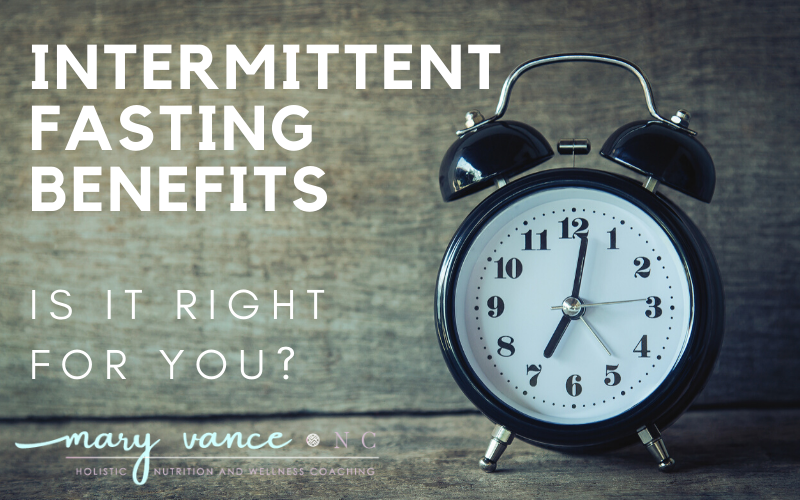Fasting is gaining a lot of traction lately due to its studied ability to reset your immune system (source) and boost weight loss (source). But you don’t have to fast for days at a time to reap the benefits. Intermittent fasting, the practice of cycling between a window of eating and abstaining, may be key to supporting your health and weight loss efforts.
Fasting in various forms is an ancient method of healing that has been practiced for thousands of years, but it has fallen out of favor in our 24 hour on-the-go lifestyles. Food and entertainment are readily available to us at all hours of day, which isn’t a great thing for our health or our waistlines. Eating too frequently during the day or late at night hinders sleep, detoxification, and weight loss efforts.
Enter intermittent fasting (IF) is the perfect compromise for those who want the benefits of fasting without having to give up food for multiple days at a time. Intermittent fasting typically means you fast for a chunk of time and eat during a specific window, but there are several ways to do it:
- 16/8 method: fast for 16 hours; do your eating in an 8 hour window during the day
- 5:2 fasting means 2 nonconsecutive fasting days per week or consume 500 calories or less on fasting days
- 24 hour fast 1-2 days per week or every other day
- Time restricted fasting on your terms that includes fasting anywhere from 14 – 16 hours overnight to 24 hours.
- Mix and match!
Intermittent Fasting Benefits
1. Perhaps the most touted IF benefit is weight loss. Studies are showing that even as little as a 12-14 hour overnight fasts may be beneficial for weight loss. One study had the overweight participants do a 14 hour fast (they ate between 8am and 6pm, only drinking water otherwise) without changing their diets during the eating window. The participants saw a 3% reduction in their weight and a 4% reduction in abdominal visceral fat on average. (source) They also saw reductions in cholesterol and blood pressure and reported improvements in sleep quality and energy. Makes sense, because going to bed on a full stomach disrupts deep sleep as your body is working to process food and isn’t in rest and repair mode.
The reason this type of IF works is when you are in a longer term fasting state, you start to deplete the glucose stores in your body, so you switch over fat as your energy source. You’re essentially entering into a low grade state of ketosis, burning fat and not glucose for fuel.
While the participants in this study didn’t change their diets (and still lost weight), if you focused on nutrient-dense foods such as organic fruits and vegetables, grass-fed and organic meats, wild-caught fish, and healthy fats, you’d reap even more benefit.
2. Aside from weight loss, improvements in insulin and blood glucose levels are another beneficial side effect. Insulin is a hormone that ushers glucose into your cells where it’s used for energy. A common culprit in type 2 diabetes is insulin resistance, when your cells shut the door and don’t respond well to insulin, leaving too much glucose circulating in your bloodstream. This is typically caused by a high sugar and high refined carb diet.
Studies show IF reduces insulin levels and reduces the risk of insulin resistance. This means that an IF diet benefits glucose metabolism and may even have anti-diabetic effects. (source) Insulin resistance is associated with inflammation, so IF may lower inflammation levels and reduce the risk of developing diabetes.
3. Improves sleep and detox: Some research has shown that eating late at night can disrupt sleep or cause sleep disturbances. As mentioned above, when the body is focused on digesting and processing a meal, one’s ability to enter into deep and restful sleep is compromised (not to mention digestion also suffers). I recommend beginning your overnight fast 3 hours before bedtime for optimal digestion, glucose regulation, and sleep. You can fast overnight for 12 hours minimum (eat dinner at 7pm, breakfast at 7am) or up to 16 hours (dinner at 6pm, breakfast at 10am).
Interestingly, scientists are also discovering we have a sort of internal clock for our organs (a main theory in Chinese medicine for thousands of years) and when meal timing does not match with the sleep-wake cycle well, there’s a disconnect between the different clocks that we have in basically all the cells and organs of the body. (source) For example, your liver and brain are most active in detoxing at night (source); eating too late disrupts sleep which compromises these processes. This can also cause increased fat storage.
4. Decrease inflammation: Researchers at Mount Sinai found that intermittent-fasting cycles lasting less than 24 hours reduces monocyte metabolic and inflammatory activity and reduces the number of pro-inflammatory monocytes in the blood. High levels of monocytes have been associated with some chronic inflammatory and autoimmune diseases. (source) So IF can improve inflammatory conditions and autoimmune diseases.
5. Fasting improves immune health, stimulates autophagy, counters the aging process. While fasting or the fasting mimicking diet may outshine IF in these areas, IF still provides these benefits. Autophagy (which literally means “self-eating”) is a detox process your body undergoes to clean out damaged cells Benefits include reduced inflammation, prevention or delay of neurodegenerative diseases, and increased longevity. IF of 14-16 hours is best to stimulate autophagy. A 24-72 hour fast produces the most benefit. During the fed state, when insulin is increased, the rate of autophagy is low. During the fasted state, as insulin drops, autophagy increases dramatically, perhaps as much as 5-fold. (source) Read more about autophagy and the science behind it here.
Additionally, IF may help repair a leaky gut, mitigate the side effects of chemo, and support brain health. (source)
How to Intermittent Fast
First off, choose a fasting plan based on your goals, health history, and lifestyle. For example, do you want to lose more than 20-30 pounds? Choose a more aggressive plan. Do you have a history of hypothyroid, low hormones or adrenal fatigue? Choose a less aggressive plan. Do you have high blood sugar, insulin, blood pressure? Do you have a history of hypoglycemia? All these factors will play into choosing the best IF plan for your needs.
The more weight you want to lose and/or the more metabolic markers you’d like to work on, such as lowering blood glucose and insulin, the more aggressive you can be. Try an 18/6 plan or even the 5:2, for example. If you have a history of hormone imbalance or hypoglycemia, use caution and start slow, 12-14 hours.
Once you’ve settled on an IF plan that suits your needs, simply eat within your eating window and fast during your fasting window. Items that don’t break your fast include water, teas, and black coffee. Anything with calories (cream added to tea or coffee, bone broth) WILL break a fast. Keep in mind that eating junk food during your eating window will partially negate the positive effects of your fast, so stick to nutrient dense foods like bone broth, organic proteins, plenty of veggies, avocado, olive oil, coconut oil, butter (if you can have dairy), and lower glycemic fruits. Taking a multi is never a bad idea. I like this one.
Who Should Not Practice Intermittent Fasting
- If you have a history of disordered eating patterns, be aware if fasting or restriction is triggering for you.
- If you’re hypoglycemic, IF may not work for you until you heal the underlying blood sugar imbalance.
- If you struggle with low thyroid or hormone balance, IF may not be right for you either. Read my post on IF and women here. Women are more sensitive to the effects of fasting.
- If you feel you may be sensitive to IF for any reason, simply start with a 12 hour fast and move up from there.
Troubleshooting
You should not IF if you are the following:
- underweight or wanting to gain weight
- under 18
- have an active eating disorder
- pregnant/breast feeding
- experience lethargy, irritability, mood swings (in this case, simply move the fasting window back to a 12 hour fast to see if that helps)
Make sure you maintain the fundamental nutrient levels your body requires and that you stay hydrated. It’s best to start slow with a 12-14 hour fast to see how you feel before advancing to a 16 hour fast. You make the rules here. You can even do a 12-14 hour fast a few days a week and 16/8 two days a week, for example. Or just fast 24 hours once a week and do a 12 hour fast the other 6 days. My opinion is everyone should do a 12 hour overnight fast for health, and this plan seems to be fine for most individuals.
Be aware that if you struggle with fertility challenges or hormone issues, the more advanced IF methods may not be right for you.
BOTTOM LINE: Intermittent fasting is a great way to drop excess weight, regulate metabolic markers like blood sugar and cholesterol, improve sleep, and stimulate your body’s healing powers (autophagy). I recommend starting slow, with a 12-14 hour fast and advancing from there if it is working for you. Experiment! Men seem to be able to do more extreme fasting than women due to women’s more sensitive endocrine systems. Use caution if you have risk factors (mentioned under troubleshooting).
How has IF worked for you?
Pin it!

Mary Vance is a Certified Nutrition Consultant and author specializing in digestive health. She combines a science-based approach with natural therapies to rebalance the body. In addition to her 1:1 coaching, she offers courses to help you heal your gut and improve your health. Mary lives in San Francisco and Lake Tahoe in Northern California. Read more about her coaching practice here and her background here.









Intermittent fasting is like a way to fast without really fasting. Missing few hours of meals at intervals, as though it is just a normal routine, can go a long way in aiding one’s weight loss plan. Not to talk of other amazing benefits. IF is goals!